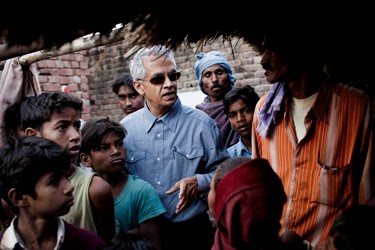"We are losing our attitude of wonder, of contemplation, of listening to creation and thus we no longer manage to interpret within it what Benedict XVI calls 'the rhythm of the love-story between God and man.'"
+ Pope Francis
Vatican sustainability conference update: A need for moral authority
Many thanks to Professor Veerabhadran Ramanathan of the Pontifical Academy of Sciences for sharing his thoughts on an upcoming Vatican conference on sustainable lifestyles.
Dr. Ramanathan is co-organizer of "Sustainable Humanity, Sustainable Nature: Our Responsibility,” which will be held at the Vatican May 2nd through the 6th. The event is jointly sponsored by the Pontifical Academy of Sciences and the Pontifical Academy of Social Sciences.
This unique conversation between the natural and social sciences is also being chaired by Archbishop (and noted professor) Roland Minnerath and Dr. Partha Sarathi Dasgupta. Some fifty noted researches in a variety of fields will be presenting. More information, including a listing of participants, is in the conference booklet.
 |
| Dr. Veerabhadran Ramanathan Photo: http://www-ramanathan.ucsd.edu/ |
Frequently sought after by the media, Dr. Ramanathan has a lengthy and extraordinary biography.
His credentials and honors include his role as Distinguished Professor at the Scripps Institution of Oceanography, University of California at San Diego and UNESCO Professor of Climate and Policy at TERI University, Delhi, India.
He has also received the United Nations 2013 “Champions of the Earth” award for science and innovation. He has made major contributions to the atmospheric sciences, especially in relation to climate change and humanity’s impact on the public health and the environment.
Dr. Ramanathan was one of three co-chairs of the Vatican study Fateof Mountain Glaciers in the Anthropocene, published in May, 2011.
Catholic Ecology: Given that the intent of the conference is to bring dialogue between the natural and social sciences—especially related to fostering sustainable lifestyles—what critical issues related to planetary ecology would you say must be considered today by the academic, industrial, and governmental sectors?
Dr. Ramanathan: The fundamental question is: How do we change the course of the current unsustainable growth? In particular, the current unsustainable course has been set by developed nations. Who has the moral authority to advise developing nations where the future growth is coming from to chart a different course? I feel Pope Francis is a ray of light for exerting such a moral authority.
Catholic Ecology: To what extent do you see this conference examining and linking both the impact of humanity’s demand for natural resources and the impact of humanity’s post-production and post-consumption levels of pollution?
Dr. Ramanathan: Your have very nicely summarize the aspirations of the organizers’ objectives for this workshop. At least the above are my aspirations.
CE: Benedict XVI famously observed that “our duties towards the environment are linked to our duties towards the human person.” As an expert on how atmospheric pollution—specifically “brown clouds”—impacts human health and agriculture, what does recent research in air pollution tell us about this link between how we treat the environment and “our duties towards the human person?”
Dr. Ramanathan: About 6.2 million die each year from air pollution indoors and outdoors. This is avoidable for we have technologies to get rid of this pollution. The indoor pollution is from cooking and heating by about 3 billion who are too poor to access fossil fuels. I call them the bottom 3 billion. The top few billion who have almost unlimited access to fossil fuels, for their own welfare, must provide access to renewable fuels to the bottom 3 billion. Please see my article at the PAS web site on “Socially Excluded”.
CE: The conference has as its goal the fostering of dialogue between the natural and social sciences. In my role as a state environmental regulator, it is clear that a lack of scientific understanding about the current state of global ecology—especially related to climate change—often hampers healthy actions by communities and civic leaders. How could the products of this conference filter down to help local leaders better understand the link between the natural sciences and such local issues as whether to relocate infrastructure or even abandon areas that are currently inhabited?
Dr. Ramanathan: Great question. I am hoping the meeting will be followed by Church leaders organizing teleconferences with church members inviting attendees of the workshop to serve as expert advisers.
CE: You co-chaired the 2011 report Fate of Mountain Glaciers in the Anthropocene. The report brought much attention to the role of faith in the natural sciences. What have your experiences with the Pontifical Academy of Sciences demonstrated to you and your colleagues about the Church’s role in issues of science, ecology, and sustainability?
Dr. Ramanathan: That workshop was a turning point in my approach for mitigating air pollution and climate change. I realized our political leaders need help from religious leaders to exercise moral authority to ask people to protect the air and the water.
CE: How has the words and actions of Pope Francis resonated with the mission and themes of this conference?
Dr. Ramanathan: Please see my response to question #1. The world urgently needs religious leaders with moral authority like Pope Francis and the Dalai Lama.



















